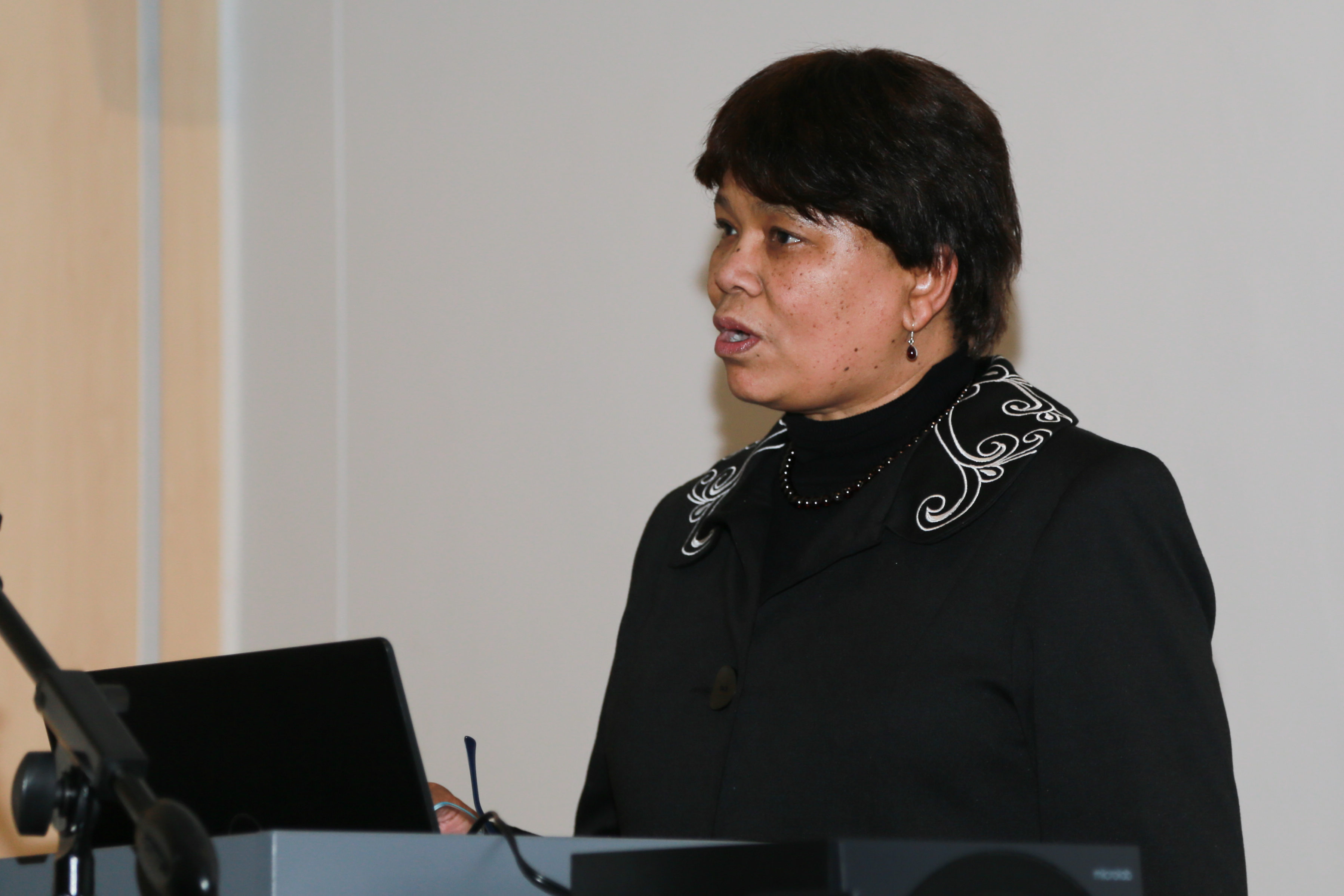Introduction
Stellenbosch University’s Library and Information Service is pleased to announce the launch of the Research Data Management Adventure Game at Stellenbosch University. The Research Data Management Adventure Game is a text-based role playing interactive fiction serious game based on the data management challenges of an academic research project. The game takes the form of an online choose-your-own-adventure format in which game players take a simulated research project through the following processes: data management planning, data collection/generation, data organisation, data description and research publication; whilst encountering data management challenges along the way. The game itself was developed as part of a collaboration between the University of Bath Library and Stellenbosch University’s Library and Information Service.
The Research Data Management Adventure Game was developed from 2017 - 2020 by: Alex Ball (University of Bath), Samuel Simango (Stellenbosch University) and Nushrat Khan (University of Bath). In January 2021, the Wellcome Trust’s Early Career Researchers Advisory Board endorsed the game by including it in the Wellcome Open Research early career researchers pack.
Aim of the Game
The objective of the Research Data Management Adventure Game is to demonstrate, if not actually teach, good practice in research data management. The game was designed to assist researchers to understand good practices of research data management. The specific learning outcomes are focused on the following aspects:
The Targeted Audience
The Research Data Management Adventure Game is aimed primarily at postgraduate students as well as early career researchers and academics. However anyone who has a vested interest in understanding how research data management works on a practical level, e.g research support staff, could find the game to be beneficial.
Game Play
The game takes players through different stages of the research data lifecycle, presents them with a data management challenge and allows them to make decisions that affect the success of their research projects. Players progress either by making straightforward binary choices or by completing something more puzzle-like. In the process certain challenges test the effectiveness of the decisions made by the players. The tone of the game has been kept light hearted so as to maintain its entertainment value.
Since the game simulates the entire research data management lifecycle the repercussions for the decisions which researchers make can be experienced in a safe environment – thus permitting researchers to make mistakes and hopefully learn from them without suffering the associated real-life consequences. Game players can opt to play the entire game or they may select to only play specific stages of the research data management lifecycle.
Find Out More and Play the Game
The Research Data Adventure Game was launched in December 2020 at the University of Bath. The game itself has been released under a Creative Commons license (CC BY-NC-SA) and is hosted on GitLab. If you are interested in playing the game you can click here.
Researchers interested in learning more about SUNScholarData are welcome to contact the Manager: Research Data Services of the Library at ssimango@sun.ac.za.
Further Reading
International Open Access Week is an annual scholarly communication event which focuses on Open Access and related topics and takes place every year in the last week of October. The theme for this year’s Open Access week is “Open with Purpose: Taking Action to Build Structural Equity and Inclusion”. In light of this theme, the Library and Information Service decided to put the spotlight on Open Data as an aspect of Open Science and inform the research community regarding the importance of Open Data as well as showcasing the growth of SUNScholarData, the institutional Research Data repository managed by the Library.
Open Data is a sub-component that exists within the broader context of Open Research. It owes its existence largely to the increasingly prominent role which research data have come to play in the world of scholarly research. The impetus behind making research data openly accessible has been a desire to democratise the data so that any person could access such data free of constraints such as paywalls. However, the need itself going beyond this and is linked to certain positive benefits which can flow out to the rest of society. Examples of this include but are not limited to the following: Improvements in the quality of research data; compliance with certain ethical and legal requirements; a reduction in the duplication of data collection efforts; an increase in the diffusion of information and ultimately knowledge throughout society and the broader dissemination of research data.
The final point cannot be over-emphasised enough. The fact that members of society can now access research data more readily on account of its openness leads to a more inclusive and equitable outcome. The outcome is inclusive in the sense that it enables more people than ever before to access research data owing to the elimination of access barriers. Not only is such an outcome inclusive, but it also levels the playing field by giving individuals who do not have financial resources just as much a chance of accessing the research data as those who are financially well-resourced. In the absence of access costs, the consumption of research data can be expected to increase. Considering that the production of research data has been increasing in the recent past, it is not surprising to observe increases in the consumption of research data over that same time period. Assuming that all other factors remain constant, the expected outcome is that a greater level of inclusivity and equity pertaining to the dissemination of research data would be attainable in the future.
Research data can be made openly accessible in one of the following ways: Supplementary data published along with journal articles; data articles published as stand-alone data papers in data journals and data published via digital data repositories.
Historically researchers have tended to make their research data openly accessible by publishing supplementary data along with their scholarly publications. However, not all academic publishers mandate the publication of research data. As such, there has generally been more scope to improve the degree to which research data could be made more openly accessible. The advent of research data repositories has changed the nature of the research publication landscape somewhat in this respect by filling this void.
In recognising the important role that research data repositories can play in facilitating the dissemination of open scientific data, Stellenbosch University set up and launched its very own institutional research data repository, SUNScholarData, on 12 August 2019.
SUNScholarData can be used for the registration, archival storage, sharing and dissemination of research data produced or collected in relation to research conducted under the auspices of Stellenbosch University. The repository has a public interface which can be used for finding content. It also has private user accounts which can be used by Stellenbosch University users in order to upload, share or publish their research data. In addition to this Stellenbosch University researchers can also use SUNScholarData in order to collaborate with researchers from other institutions.
The first dataset was deposited in SUNScholarData on the 7 August 2019. Since then the number of deposits has increased at a modest rate and now totals 84 datasets. Some 21 of these datasets have been published and are openly accessible. The datasets have been viewed 9,564 times and generated 1,559 downloads since August 2019.
In addition to permitting the deposit of research data, SUNScholarData’s system facilitates the bulk-linkage to supplementary data originally submitted to academic publishers. Currently this is only possible with supplementary data associated with the Public Library of Science’s (PLOS) journals. On 16 September 2020, a total of 3,508 PLOS datasets were linked to SUNScholarData. These datasets cover a time-period ranging from 2006-2020 and provide a broad view of openly accessible research data that span across several academic disciplines.
SUNScholarData provides several benefits which can be harnessed by Stellenbosch University researchers. The greatest benefit which researchers who have published research data on SUNScholarData have experienced is the increased visibility which the repository brings to their research data. As SUNScholarData is visible and accessible online it is certainly better than the option of storing research data on local as well as external hard drives. Furthermore, the repository stores research data securely in accordance with recognised ISO standards. The research datasets are curated prior to publication, thus ensuring quality and by extension trustworthiness. SUNScholarData facilitates compliance with research funder mandates, which may require that the research data associated with funded research be shared publicly upon the completion of research projects. SUNScholardata also facilitates compliance with the policies of academic publishers, which sometimes mandate that the research data underpinning research publication be published via research data repositories.
Researchers interested in learning more about SUNScholarData are welcome to contact the Manager: Research Data Services of the Library at ssimango@sun.ac.za
Samuel Simango
Stellenbosch University's Library and Information Service has reached another milestone as South African leader in open access to knowledge with the launch of its SUNScholarData repository.
In the past decade, the management of research data has taken on a more prominent role in tertiary education institutions around the world. This has been primarily due to the increasingly data-centric nature that academic research has taken.
As a leading research institution, Stellenbosch University (SU) is helping to address this issue by taking the necessary steps to adopt appropriate data management practices. One of these steps is the establishment of an institutional research data repository at the University called SUNScholarData.
SU's Library and Information Service officially launched it on Monday, 12 August 2019 at The Stellenbosch Institute for Advanced Study (STIAS) in Stellenbosch.
During the launch event Ms Ellen Tise, Senior Director: Library and Information Services at SU, excitedly shared her joy with those in attendance about finally launching SUNScholarData. According to Tise, it has taken over seven years to establish and launch SUNScholarData, making it the longest project the library has embarked on in recent years.

“It has been quite a long journey. The day has finally arrived for Stellenbosch University to join the growing number of institutions around the world who have established research data repository. I'm super excited and so pleased that we have come this far," Tise said.
The implementation of SUNScholarData forms part of the Library and Information Service's role regarding research data support which has been identified as a strategic objective of the Library and Information Service in terms of supporting research by providing world-class, diverse, innovative and client-oriented services.
Some of the set of services that SUNScholarData as institutional research data repository will provide is to capture, store, index, preserve and redistribute the University's research data in digital formats. There are also two purposes for relying on an institutional research data repository. Firstly, this would create a medium through which SU's research data can be made findable and accessible. Secondly, it would facilitate the interoperability and re-usability of the University's research data.

Prof Eugene Cloete, Vice-Rector (Research, Innovation and Postgraduate Studies) at SU, said in his welcoming at the event the launch of SUNScholarData was a direct result of the Berlin Declaration on Open Access to Knowledge in the Sciences and Humanities that SU signed in 2010.
“The Library and Information Service has really taken the lead in South Africa when it comes to open access and it started way back in 2010 when we became the first university to sign the Berlin Declaration on Open Access to Knowledge in the Sciences and Humanities. Since then the library has strengthened and developed its own initiatives including SUNScholar, an open institutional repository established in 2008, SUNJournals, an open journal-hosting platform established in 2011, and then SUNDigital Collections, a digital heritage repository established in 2013 and now we continue with our open science journey with the launch of SUNScholarData," said Cloete.
The main functionalities of SUNScholarData will help with research data management, research data dissemination, administrative workflow management, impact and usage reporting.

Prof Wim de Villiers, SU Rector and Vice-Chancellor believes that SUNScholar will be a leading digital archive for the preservation and promotion of the research output of Stellenbosch University.
“Our Vision 2040 is to become 'Africa's leading research-intensive university, globally recognised as excellent, inclusive and innovative, where we advance knowledge in service of society' – and SUNScholarData will help us get there," De Villiers remarked at the launch.
Stellenbosch University Library and Information Service, Helpline Numbers: +27 21 808 4883, Postal Address: Private Bag X5036 Stellenbosch, 7599
